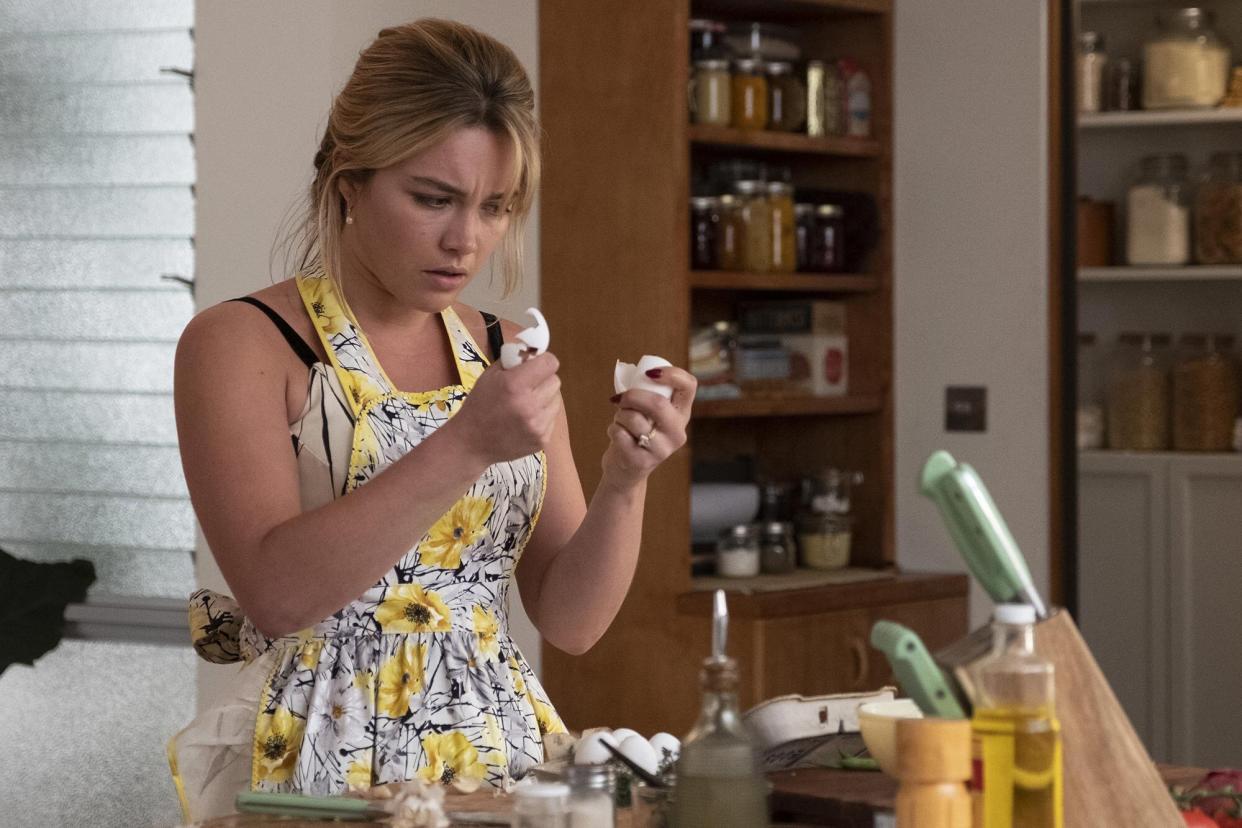Don't Worry Darling review: Florence Pugh and Harry Styles get lost in Shangri-La

- Oops!Something went wrong.Please try again later.
- Oops!Something went wrong.Please try again later.
Behold the plight of the new desperate housewife: She is trapped in something — a sitcom (Kevin Can F**k Himself), a metaverse (WandaVision), or like Florence Pugh's Alice in Don't Worry Darling, a sun-baked suburban idyll so dreamy, it's surely too good to be true. Unfortunately, she's also preceded by innumerable other films that have explored this black-mirror territory before: The Stepford Wives, Pleasantville, The Truman Show. That familiarity drains much of the tension and mystery from Darling, a movie high on snazzy midcentury style but considerably less bothered by the mechanics of cohesive storytelling.
In a world that looks like a glossy palm-tree-dotted cross between Norman Rockwell and Mad Men, Alice and Jack (the impish, dimpled pop star Harry Styles) are the envy of their friends, the kind of couple who can barely make it through a cocktail party or even breakfast without tearing each other's clothes off. They're well-off financially too, though the signifiers of their wealth — the impeccable wardrobe, the showcase home, the finned sedan gleaming in the driveway — match their neighbors' almost exactly; everyone's a winner here. That's because they're all part of some grand experiment called the Victory Project, helmed by a self-styled guru named Frank (Chris Pine, a wolf in Rat Pack clothing) and predicated on some vague principle few residents seem willing to explain or even examine too closely, except that it involves the "development of progressive materials."

Merrick Morton/Warner Bros.
In this retrograde Shangri-La, it's every husband's duty to head off to Victory headquarters in those shiny cars and do whatever is they do, and the wives to be waiting at home when they're done with a highball and a smile. Nobody is allowed to venture outside town limits, but who has time for wandering when there's already so much to do? Prep the pot roast, scrub the bathtub spotless, take remedial ballet lessons or lay by the communal pool. Some, like Olivia Wilde's imperious Bunny and Frank's glacial, gorgeous wife (Eternals' Gemma Chan) are born for this gilded cage; others — particularly one increasingly desperate outlier (If Beale Street Could Talk's KiKi Layne) — can't seem to stop asking questions that no one, except maybe Alice, wants the answers to.
Wilde is also the director, and Darling is her darling: a polished candy-apple take on cracked utopia, encased in blinding Southern California sunlight and bright vintage pop ditties. At least some credit for the movie's distinctive look is due to veteran cinematographer Matthew Libatique (Black Swan, A Star Is Born), a frequent collaborator of Darren Aronofsky and Spike Lee who gives the film its fever-dream desert sheen. And spare some blame for the wobbling script, on which three writers share story credit; unlike Wilde's charmingly ramshackle 2019 debut Booksmart, the machinations here are more ambitiously outlined and story-driven, and as Darling goes along, the Edsel wheels, as it were, begin to come off.
The red flags in Victory surface early and often, like voles on a country-club lawn: not just Frank's purring low-grade malevolence or the prop plane that seems to fall out of a clear blue sky, but the jarring, jittery visions that surface like unwelcome late-night transmissions in Alice's mind. Pugh, the 26-year-old British actress whose fierce emotional intelligence belies her doll-like prettiness in films like Midsommar and Little Women (for which she received her first Oscar nod), gives Alice as much inner life as the skittering screenplay allows, and Styles, at least, looks fantastic in a suit. But the movie, whatever its pile of ideas about love, gender constructs, and modern living, never really transcends Stepford mood-board pastiche. It's all nefarious and gorgeous, Darling, and strictly nonsense in the end. Grade: B–
Related content:

